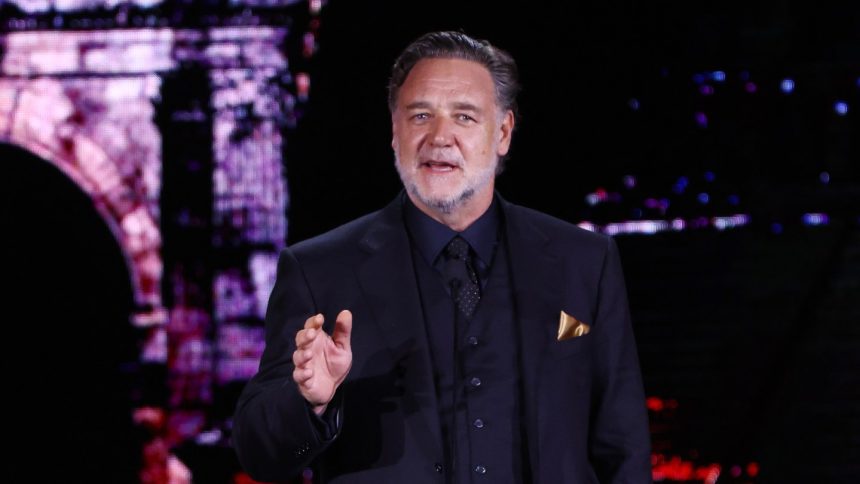Russell Crowe Returns to Malta, Site of ‘Gladiator’ Filming, And Recalls Intensity of Ridley Scott Epic: “It Wasn’t an Easy Production”
There’s a moment in Ridley Scott’s Gladiator when Russell Crowe’s enslaved Roman general Maximus, fresh from eviscerating five foes in short order, throws his arms in the air and asks a stunned arena, “Are you not entertained? Are you not entertained?”
It would not be that far from fiction to picture the organizers of Sunday night’s Golden Bee Awards repeating the same question after the final spectacle had been presented to close out a nearly three-hour ceremony held inside Gzira’s Fort Manoel in Malta. Presented by the Mediterrane Film Festival and hosted by David Walliams, the outdoor show finished shy of midnight and by that point had featured around a dozen musical numbers (complete with props, backup dancers and custom backdrops), a slew of Hollywood presenters (Anna Camp, Chris Perfetti, Jared Harris, Karen Pittman and Thunderbolts* director Jake Schreier), three fireworks displays and even Maximus himself.
Crowe made a triumphant (and surprise) return to Malta to accept a film legend award to mark the 25th anniversary of Gladiator. The film, like its recent sequel, was shot on the islands not far from the historic 18th century fort that hosted the awards and has long been a source of local pride.
“You want to know what I love about Malta? Everything,” Crowe declared, calling the island nation a “paradise,” one that he has regularly visited over the years on vacation. To prove his point, he said he arrived with his two sons, walked the streets of the capital city of Valletta at sunset, acquired his favorite lasagna and admired his favorite jewelry store Mario Zampa. “I love coming to Malta and I’m grateful for your welcome every time I’m here.”
You Might Also Like
Crowe accepted his trophy from Johann Grech, Malta film commissioner and CEO of Malta Film Studios. He praised Grech for his commitment and passion for Malta and his “understanding of the opportunity that Malta has at the center of the Mediterranean film industry.” With that, Crowe urged the local government to further fuel a commitment to the arts and to support education for young Maltese people “who want to explore film as a career in whatever capacity because it truly takes a village to make a movie.”
Crowe then recounted coming to the country 26 years ago to star in the epic Gladiator. “You could say, in a funny way, I became a man in Malta,” he said. Whatever films I’d done before then, nothing had the majesty, ambition, budget and ultimately reach of Gladiator. I say ‘became a man’ because it wasn’t an easy production. I had to fight everyday for the integrity of the character I was playing, just like the journey of the character himself in a movie. Sometimes you get lucky enough to make something that resonates with people.”
It’s still resonating. Crowe detailed an encounter he had with a man a week ago while visiting Monterosso in Italy’s Cinque Terre. “I was leaving a restaurant at nighttime. As I came out in the street, this young man, he saw me, he recognized me, and he asked me for a photo,” Crowe recalled. “I shook his hand and he started to cry. His friends told me later that he’s the head lifeguard at the local beach — he’s got muscles on muscles and lots of responsibility and authority — and they’d never seen him like that.”
Crowe said the “crying got more intense” and the man couldn’t wipe the tears from his eyes, so he ended up hugging him. “When he got himself together, he said, ‘You don’t understand. When I was 8 years old, my mother sat me in front of TV and put on a video cassette of Gladiator. She told me that if you are ever wondering what type of man your mother expects you to be, it’s this type of man — the honor, the integrity, the faith, this type of man.’ A man made in Malta.”
The anecdote drew cheers and applause from the crowd, estimated at close to 2000 guests. Prior to Crowe’s remarks, Grech delivered a lengthy address that resonated much like a campaign speech. He paid particular attention to the milestone anniversary — 2025 marks 100 years of filming in Malta — while also noting the strides that have been made under his administration. Malta has long been a magnet for Hollywood as it has welcomed such films as Munich, Troy, Jurassic World Rebirth, Captain Phillips, World War Z, Murder on the Orient Express, Assassin’s Creed, By the Sea, The Da Vinci Code, The League of Extraordinary Gentlemen, Last Breath and dozens of others.
Grech called out the skeptics that doubted Malta’s place as an international hub for filmmaking and said that they’ve come from “yes we can” to “yes we have” over the past nearly eight years (thanks in large part to a lucrative 40 percent tax rebate). “The film industry is bigger than it’s ever been,” Grech said. “The next 100 years will be better than the first. Let us never stop believing because we are Malta. We are film.”
The last sentence repeated the theme of this year’s Mediterrane Film Festival, established on the islands of Malta in 2023 as a showcase for films from the area and beyond. This year’s edition wrapped Sunday after running from June 21-29, and featured 55 films from more than 20 countries. Sunday night’s Golden Bee Awards saw the official festival prizes doled out as chosen by the juries in addition to one people’s choice award.
Amel Guellaty’s Where the Wind Comes From picked up steam by claiming two awards including best feature film and best performance for Eya Bellagha’s starring turn in the drama which follows a rebellious 19-year-old Alyssa (Bellagha) and shy 23-year-old Mehdi (Slim Baccar) who dream of escaping their reality. Upon discovering a contest offering a chance to flee, they set out on a road trip to southern Tunisia.
Julio Medem’s 8 also picked up two prizes including best screenwriting for its writer-director Medem as well as a jury’s choice award. The film covers 90 years and follows the eight encounters between a man, Octavio (Javier Rey), and a woman, Adela (Ana Rujas), that so happen to mirror pivotal moments in Spain’s history. The Mare Nostrum award went to Miyazaki: Spirit of Nature, which was “recognized for its lyrical exploration of nature and spirit,” per the jury, while the people’s choice award went to Polly Steele’s Four Letters of Love.
Serving the Mediterrane Film Festival jury this year were Catherine Hardwicke, Elli Griff, Rick Carter, Charlese Antoinette, James Price, Mario Philip Azzopardi and Joseph Vassallo. A special Mare Nostrum jury, comprised of Grainne Humphreys, Ania Trzebiatowska and Melisa Sözen, selected from a roster of films curated around themes of climate and environmentalism.
Crowe was far from the only notable name honored Sunday. Fellow Oscar winner Jeremy Thomas, a veteran producer who landed gold for Bernardo Bertolucci’s best picture winner The Last Emperor from 1988, was presented with a lifetime achievement award while veteran location manager Pierre Agius snagged a career achievement honor. As previously announced, Euphoria breakout Barbie Ferreira touched down in Malta to pick up a rising star award for her screen accomplishments. The black-tie gala also hosted boldfaced names like Jon Watts, Edmund Donovan, Joaquim De Almeida, Bailey Bass, Kerry Ingram and more. See below for scenes from inside Sunday’s celebration.







